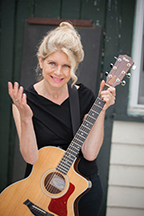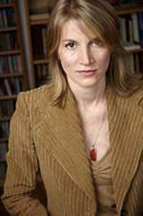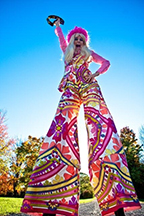By Mike Kinosian
TALKERS magazine
Managing Editor
 NEW YORK — With apologies to Abraham Lincoln for taking modification liberties with a highly exemplary quote attributable to our esteemed 16th president, but a person never stands so tall as when they stoop to help someone in need.
NEW YORK — With apologies to Abraham Lincoln for taking modification liberties with a highly exemplary quote attributable to our esteemed 16th president, but a person never stands so tall as when they stoop to help someone in need.
Over the past several decades, one particular eclectic woman has provided comfort by physically reaching down to offer uplifting comfort, while at other times, providing entertainment while delicately perched… on stilts.
Different take on the dating game
New York City-born Bibi Farber (at right) and her two-years younger sister Celia (below, left) grew up in the Big Apple. Their parents had long been separated and in 1976 the two young girls (13 and 11 at the time) relocated to Orebro, Sweden with their mother, Ulla. “I didn’t want to go, but it wasn’t up to me,” emphasizes Bibi, who would wind up living in Sweden for six years – Celia for eight; both finished high school there. “I went to the United Nations School and loved it. Even though [my father – talk radio icon Barry Farber] saw less of us, he loved that we were living in Sweden. He thought it was a much safer place than New York, which in the mid-1970s, was no place for two teenage girls to live. Sweden was a great place, although we did split with American culture.”
grew up in the Big Apple. Their parents had long been separated and in 1976 the two young girls (13 and 11 at the time) relocated to Orebro, Sweden with their mother, Ulla. “I didn’t want to go, but it wasn’t up to me,” emphasizes Bibi, who would wind up living in Sweden for six years – Celia for eight; both finished high school there. “I went to the United Nations School and loved it. Even though [my father – talk radio icon Barry Farber] saw less of us, he loved that we were living in Sweden. He thought it was a much safer place than New York, which in the mid-1970s, was no place for two teenage girls to live. Sweden was a great place, although we did split with American culture.”
 Neither Bibi nor Celia spoke Swedish prior to moving to Sweden. “I studied three hours of Swedish in the morning and then went to ‘regular’ classes in the afternoon,” Bibi recalls. “After about three months, I felt I could understand and speak Swedish – it just built from there.”
Neither Bibi nor Celia spoke Swedish prior to moving to Sweden. “I studied three hours of Swedish in the morning and then went to ‘regular’ classes in the afternoon,” Bibi recalls. “After about three months, I felt I could understand and speak Swedish – it just built from there.”
Whether one subscribed to Barry Farber’s conservative ideals is immaterial since this gifted broadcaster embodied an exchange of ideas rather than presenting chest-pounding viewpoints.
Among the languages in which he felt most comfortable are Albanian, Chinese, Finnish, French, Hungarian, Norwegian, Spanish … and Swedish, so Bibi living there wasn’t a major surprise. In a lengthy conversation Barry and I had in 2009, he stressed that English is the lone language he spoke. “I’m a student of about 24 others. Some you date – others you marry. I date about half where I only learn phrases so you can talk to cab drivers and people at convenience stores. Most conversations never get beyond the superficial level anyhow. The ones you speak well are your favorites.”
Rock trendsetter returns home
Albeit that Bibi didn’t start playing music until becoming a high school student in Sweden, she loved rock music and was self-taught. “I didn’t have any formal music training but was able to play in punk bands,” she points out. “I was a classic rock kid from New York, so I was into artists such as Led Zeppelin, David Bowie, Elton John, the Who and the Stones. When I got to Sweden, those artists weren’t big there. They didn’t have any commercial radio as we do in America.”
During the post-punk era, Bibi and Celia were part of a group forming an alternative cultural center in Sweden; the latter played drums until about 25 years ago and is now a well-known print journalist and author. “We started a rock scene,” confirms Bibi. “You can always get some government money there by starting something. It was as though we had a grant and we were able to run a rock club. One of the bands that came out of the scene – First Aid Kit – had a big career with about a dozen records; their daughters have become international successes.”
Notwithstanding that she enjoyed her time in Sweden, Bibi explains, “My father wanted us back in New York and I wanted to return, as well. I really didn’t know what I wanted to do, but I studied music technology at NYU. I’m a songwriter and what I write is original, imaginative pop rock songs.”
Part of Bibi’s routine these days is to perform for many people in hospitals, nursing homes, and similar locations. For that reason, she is “fascinated by learning standards; songs with a jazz-bend; and pop songs with sophisticated writing. As a songwriter, I’ve traditionally been influenced by the Who, the Smithereens, and a lifetime of indie rock. I played for five years with [American guitarist/singer-songwriter/founding member of the rock band Television] Richard Lloyd. I’ve put out three records independently – two pressed in a CD format [‘Firepop’ in 1999 and ‘Second Kiss’ in 2004]; the third [released in 2011] is available digitally. This eight-song collection represents a completely different side of my work.”
Joy of seeing smiles
It was when she began serving as a volunteer approximately 20 years ago through the organization Musicians On Call that Bibi began entertaining people in assisted living facilities. “It was tricky to transition to play music in those environments,” she states. “They didn’t want to hear songs such as [Johnny Nash’s 1972 single] ‘I Can See Clearly Now’ – they wanted to hear Frank Sinatra. The people I play for now are only about 15 – 20 years older than I am. Some are there because they need a month or two of rehab, so there are instances where they are actually younger.
Conceding that it wasn’t a good fit when she first started playing for people in hospitals, nursing homes and assisted living facilities, Bibi acknowledges their preference was for standards, not pop rock. “Some people catered to that audience by playing piano. Because of the population density in New York City, I could do two gigs a day and just bring my guitar on the subway.”
At the start of the pandemic, she moved roughly 125 miles north of New York City to the Hudson Valley and is consequently driving a lot more although, she admits that, “The gigs are fewer and far between.”
Even so, she is “trying to hustle together” as many as she can. “I have come to love the vibe of performing for the least well off to the most well off. There is nothing more joyous than making them smile.”
Father knows best
This entire concept – Bibi underscores – was actually Barry’s idea. “He always said I could have a great career if I learned older songs, including silly novelty songs from his youth. He was absolutely correct, but it took me a long time to do it. It was also his idea to offer a free show to every facility, instead of trying to get them to book me by looking at videos. Once again, he was right and that’s exactly what I do. He was fascinated by all things Norwegian and was able to hook me up with the Norwegian Christian Home.”
After providing them a free show, Bibi was put into their rotation. “That’s an example of something I did when I lived in New York,” she reveals. “Barry had an inclination to reach out to all cultures – I really picked that up from him. Not that I have a huge repertoire, but to reach some people from the West Indies, I’m trying to learn some calypso and Jamaican songs. Barry instilled in us the importance of learning language of ‘the other guy,’ so I do that in a musical way.”
Several of Bibi’s songs have been placed in commercials. That’s not exactly something that is easy-to-pursue, but as the author of the essay “All The Guys I Meet At Work Are Clowns” details that about 30 seconds of one of her songs was used on a Kodak commercial and another was used in an A&E promo. “I have over 300 placements in total. I still get royalties from all over the place. I had nothing to do with reaching out or sourcing. I usually don’t even get to hear how the songs have been used – I just see the royalties.”
Anxiety followed by gratification
Roughly 26 years ago, Bibi was dating a juggler who was putting together a novelty act. “Back then, there were enormous budgets in metro New York for novelty entertainment and he formed a seven-piece band. My goal was to make money and it was so profitable. In today’s dollars, our first gig paid over $650 a person for one set.”
“Back then, there were enormous budgets in metro New York for novelty entertainment and he formed a seven-piece band. My goal was to make money and it was so profitable. In today’s dollars, our first gig paid over $650 a person for one set.”
Simply working up the courage to be on stilts is one thing, but there’s the added tricky component of simultaneously playing guitar and Bibi confesses she was “scared to death” when she did it the first time. “One of our first gigs was walking in New York’s Halloween parade, which is almost as exciting as Macy’s Thanksgiving Day parade. It’s a huge nighttime attraction and a little bit scary.”
Parade producers contacted Bibi to walk 20 minutes before the parade started. “The bass player had a platform with a wheel under it, so he played an upright bass as he was walking on stilts – in the dark,” she elaborates. “It was so crazy and the very last thing I wanted to do – it was just insane. By the end of that walk, however, I was as happy as I can ever remember being and – to this day, even though I’m not at all a ‘circus arts’ or ‘silly’ person – I’m still fielding stilt gigs. It took me out of the self-absorbed, rock musician world that I otherwise would have exclusively delved into.”
In addition to working as a stilt-walker and nursing home/hospital/assisted-living entertainer, Bibi Farber has a blog and is writing a children’s book that is being rolled out on Substack. “It’s not just a cute children’s book, but for animal lovers in general and is in the voice of a pet rabbit,” she comments. “I would like to think my writing from the voice of this rabbit plays a role in animal rights and I hope to make some difference in that area.”
World’s wakeup call
Listening these days to “way more talk radio than music radio,” self-described “progressive libertarian” Bibi asserts, “There is so much happening in the world that we need to pay attention to. One of my songs is ‘The World Is Waking Up Right Now’ and I suppose it can be used on either political side. I’m a big fan of one of the most popular guys out there – Dave Ramsey. I don’t really like most of the conservative talk radio hosts, although I’ll listen to Sean Hannity because he really loved Barry. As divergent as might seem, Dave Ramsey and Gary Null [heard 12:00 noon – 1:00 pm on Pacifica Foundation New York’s WBAI] are my two favorite talk show hosts.”
Unfortunately, we’ll never know Barry Farber’s thoughts about the current state of talk radio, as TALKERS’ 2012 “Lifetime Achievement Award” winner passed away in May 2020, one day after his 90th birthday. In the aforementioned conversation with him, he assessed his style as not wanting to sound like, “sinking fangs into egg-sucking dogs.”
radio, as TALKERS’ 2012 “Lifetime Achievement Award” winner passed away in May 2020, one day after his 90th birthday. In the aforementioned conversation with him, he assessed his style as not wanting to sound like, “sinking fangs into egg-sucking dogs.”
Rather, he discussed issues calmly, told good stories and brought back “harmonic recollections from the past that fit today’s headlines. I don’t have any dreams of glory – I just want to find that niche.”
Props to her pop
Those level-headed comments, as well as the following two observations, were part of our 2009 discussion. Judge for yourself if his prognostications/hopes came to fruition: “I’d like to think the heated, angry right-wing radio of 1994 is calming down. The election of Barack Obama proved something has changed.”
Despite being around her legendary talk radio father, Bibi never held any aspirations for a radio career. “I still can’t believe how he could speak so eloquently off the top-of-his-head,” she marvels. “Barry is on one of my records, ‘Brand New Day’ [released in 2011]. The producer had the idea to record him in the role of broadcaster/weatherman. He’s very recognizable and prominent in it.”
Current leisure time activities for Bibi include a continued passion for music, love of animals, and studying Latin dancing. “At the end of the day, I am proudest of my work in nursing homes,” she proclaims. “Barry called it ‘God’s work.’ People can start responding even if they are literally in a coma. I am very proud awakening the wonder of music to people who are stuck in a room. I hope I’ve given people a lot of joy with my music and writing.”
You can learn more about Bibi Farber at her website, www.BibiFarber.com.
Contact TALKERS managing editor Mike Kinosian at Mike.Kinosian@gmail.com


